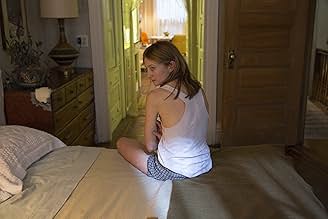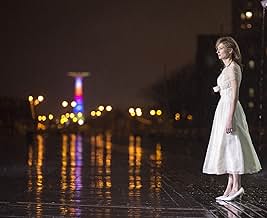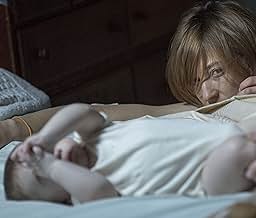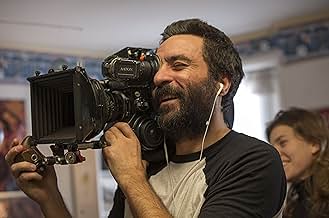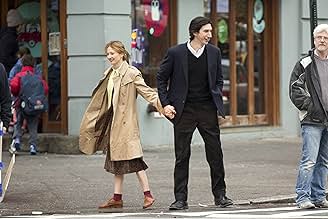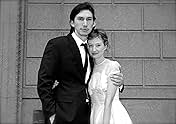VALUTAZIONE IMDb
6,5/10
6155
LA TUA VALUTAZIONE
La relazione di una coppia che si incontra per caso a New York City viene messa alla prova quando si ritrovano in una circostanza di vita o di morte.La relazione di una coppia che si incontra per caso a New York City viene messa alla prova quando si ritrovano in una circostanza di vita o di morte.La relazione di una coppia che si incontra per caso a New York City viene messa alla prova quando si ritrovano in una circostanza di vita o di morte.
- Regia
- Sceneggiatura
- Star
- Premi
- 7 vittorie e 19 candidature totali
Natalie Gold
- Lawyer Jennifer Donadio
- (as Nathalie Gold)
Drew Gregory
- Jude's Friend
- (non citato nei titoli originali)
Cristina J. Huie
- NYPD Officer Dugan
- (non citato nei titoli originali)
Recensioni in evidenza
Great acting, but for me it was difficult and painful to watch. The plot, combined with the way it was filmed, these weird angels, it was a bit too much.
While we patiently wait for Adam Driver to become a household name, there's plenty of big screen spoils from last year's film festivals to enjoy, including While We're Young and Hungry Hearts. It opens with a misleading, endearing and hilarious meet-cute where Driver and co-star Alba Rohrwacher first fall in love trapped in a bathroom with Driver's own stench. Perhaps sly foreshadowing that their story revolves around nutrition, I didn't expect the film to focus on the 'hungry' part of its 'hearts' while I prepared for something humorous and composed. It's none of those two. While it peaks in its opening minutes, that's not to say there isn't something of worth to follow. The idea of having the diet of a child being the source of conflict between a couple is unique in cinema, but a very real concern. It does paint Rohrwacher as too much of a villain at times but the duo's impeccable performances do their characters justice and it's often heartbreaking. It's such a shame that it's incompetently shot. I get the raw intimate aesthetic, but it feels like rehearsal footage, and when it's being creative with fish eye lenses to distort Rohrwacher's figure, it feels far too on-the-nose. The misguided style holds the film back, but the performances win out.
7/10
7/10
I'll admit, I was only interested in seeing this initally because I'm a huge Adam Driver fan. I knew nothing about the plot going in but found myself hooked on what I found to be a really stunning film.
At times the film almost feels like theatre, with some scenes being filmed in such a way that you feel like you're in the room with them. In a way it makes Jude and Mina's relationship feel all the more real; from their unlikely romantic start right through it's eventual unravelling. There are times in the film where Mina's presence almost evokes a sense of horror in the film, carefully crafted by the film's score.
Hungry Hearts perhaps finds its best quality in it's tonal shift from beginning to end, as well as the outstanding performances by both Adam and Alba, who give such an honesty to the characters that it's hard to feel as if you don't know them personally. I think the film does a great deal to question the moral stance of the viewer: each of the main characters makes decisions throughout the film that are questionable at best, but when put into context are almost justified by their personal idea of what is best for the baby. Almost.
Coming out of the film, it's hard not to imagine what might have happened if Mina's mental illness had been treated, and how that might have affected the films trajectory. Either way, I know Hungry Hearts will sit with me for a while.
At times the film almost feels like theatre, with some scenes being filmed in such a way that you feel like you're in the room with them. In a way it makes Jude and Mina's relationship feel all the more real; from their unlikely romantic start right through it's eventual unravelling. There are times in the film where Mina's presence almost evokes a sense of horror in the film, carefully crafted by the film's score.
Hungry Hearts perhaps finds its best quality in it's tonal shift from beginning to end, as well as the outstanding performances by both Adam and Alba, who give such an honesty to the characters that it's hard to feel as if you don't know them personally. I think the film does a great deal to question the moral stance of the viewer: each of the main characters makes decisions throughout the film that are questionable at best, but when put into context are almost justified by their personal idea of what is best for the baby. Almost.
Coming out of the film, it's hard not to imagine what might have happened if Mina's mental illness had been treated, and how that might have affected the films trajectory. Either way, I know Hungry Hearts will sit with me for a while.
Judging by the comments of previous reviewers, Saverio Costanzo's film has divided reviewers and audiences alike. Perhaps this is due to its combination of tones: the apparently artless beginning that does not prepare us in any way for the film's major issue, that of how to reconcile one's inner beliefs with the realities of bringing up a child. Or perhaps it's because of the desperate measures adopted by the child's grandmother (Roberta Maxwell) in an attempt to ensure the child's future welfare. Some have dismissed them as melodramatic: one wonders what they might do in a similar situation.
The main point at issue here is one of obsession: Mina (Alba Rohrwacher) believes that her newly-born son is somehow special and needs to be "protected" from supposedly corrupting influences such as doctors, red meat or sunlight. The fact that this results in the child's attenuated growth is a side-effect. Her husband Jude (Adam Driver) tries to make her see reason (as he perceives it), but fails to do so. Director Costanzo invites us to reflect on the morality of both protagonists - is one "right" and the other "wrong"? Or are there other issues involved here?
What gives the film its particular resonance is its style. Very little music appears on the soundtrack - except at the end; hence we as viewers are not guided into making a specific response to what we see. Fabio Cianchetti's camera is fond of consciously out-of-focus shots, transforming the characters into other-worldly beings rather than New Yorkers. This strategy reminds us quite powerfully of how anyone departing from ideological or social behavioral norms is invariably dismissed as "deviant." Sometimes this visual technique seems excessive - as for example, when Mina is shot in such a way as to emphasize a large head and skinny body - but we can understand the purpose behind it.
In this kind of film, it is difficult to maintain some sense of dramatic balance. All credit, then, to the three protagonists, whose performances seem inspired by the situations contained in the screenplay, and refrain from dramatic or gestural excesses.
The main point at issue here is one of obsession: Mina (Alba Rohrwacher) believes that her newly-born son is somehow special and needs to be "protected" from supposedly corrupting influences such as doctors, red meat or sunlight. The fact that this results in the child's attenuated growth is a side-effect. Her husband Jude (Adam Driver) tries to make her see reason (as he perceives it), but fails to do so. Director Costanzo invites us to reflect on the morality of both protagonists - is one "right" and the other "wrong"? Or are there other issues involved here?
What gives the film its particular resonance is its style. Very little music appears on the soundtrack - except at the end; hence we as viewers are not guided into making a specific response to what we see. Fabio Cianchetti's camera is fond of consciously out-of-focus shots, transforming the characters into other-worldly beings rather than New Yorkers. This strategy reminds us quite powerfully of how anyone departing from ideological or social behavioral norms is invariably dismissed as "deviant." Sometimes this visual technique seems excessive - as for example, when Mina is shot in such a way as to emphasize a large head and skinny body - but we can understand the purpose behind it.
In this kind of film, it is difficult to maintain some sense of dramatic balance. All credit, then, to the three protagonists, whose performances seem inspired by the situations contained in the screenplay, and refrain from dramatic or gestural excesses.
The opening scene is funny and mortifying at the same time, giving a false sense of a under budgeted romantic comedy to the film, but then it gets darker. The awkwardly sweet duo become one, they fall in love and hit off. Step by step, things get serious and these lovebirds turn into an unnerving couple as the movie gets psychological and somber.
Originally - in the book - in Italy, the story was transposed to New York City because the Italian director thought that it belonged in there. I don't know if I agree completely but given what is depicted in the film I understand this choice.
Saverio Costanzo used tight shots and close ups to bring the intimacy needed for the story. As the story develops each scene gets a shade darker and the intimacy of the shots seem to illustrate Jude (Driver) and Mina (Rohrwacher)'s state of minds. It's subtle and masterfully crafted to bring you a place where you never thought you'd go. The chips fall into place and you realize what you're in for, Mina and Jude start to make sense and a chill crawls up your spine. The slight sense of dread takes over just enough to keep captivated, but not fully engaged to make you too uncomfortable and wary. If it was done any other way it would have probably been too hard to watch, instead, like a car crash you find yourself watching these people on their way down the rabbit hole.
@wornoutspines
Originally - in the book - in Italy, the story was transposed to New York City because the Italian director thought that it belonged in there. I don't know if I agree completely but given what is depicted in the film I understand this choice.
Saverio Costanzo used tight shots and close ups to bring the intimacy needed for the story. As the story develops each scene gets a shade darker and the intimacy of the shots seem to illustrate Jude (Driver) and Mina (Rohrwacher)'s state of minds. It's subtle and masterfully crafted to bring you a place where you never thought you'd go. The chips fall into place and you realize what you're in for, Mina and Jude start to make sense and a chill crawls up your spine. The slight sense of dread takes over just enough to keep captivated, but not fully engaged to make you too uncomfortable and wary. If it was done any other way it would have probably been too hard to watch, instead, like a car crash you find yourself watching these people on their way down the rabbit hole.
@wornoutspines
Lo sapevi?
- QuizBased on the novel Il Bambino Indaco (The Indigo Child) by Marco Franzoso.
- ConnessioniFeatured in Witches (2024)
I più visti
Accedi per valutare e creare un elenco di titoli salvati per ottenere consigli personalizzati
- How long is Hungry Hearts?Powered by Alexa
Dettagli
- Data di uscita
- Paese di origine
- Lingua
- Celebre anche come
- Corazones hambrientos
- Luoghi delle riprese
- Aziende produttrici
- Vedi altri crediti dell’azienda su IMDbPro
Botteghino
- Lordo Stati Uniti e Canada
- 6921 USD
- Fine settimana di apertura Stati Uniti e Canada
- 1869 USD
- 7 giu 2015
- Lordo in tutto il mondo
- 549.823 USD
- Tempo di esecuzione
- 1h 49min(109 min)
- Colore
- Mix di suoni
- Proporzioni
- 1.66 : 1
Contribuisci a questa pagina
Suggerisci una modifica o aggiungi i contenuti mancanti








